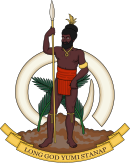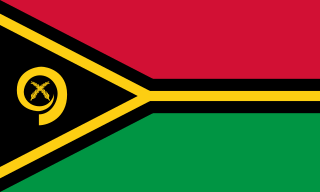
Vanuatu, officially the Republic of Vanuatu, is an island country in Melanesia, located in the South Pacific Ocean. The archipelago, which is of volcanic origin, is 1,750 km (1,090 mi) east of northern Australia, 540 km (340 mi) northeast of New Caledonia, east of New Guinea, southeast of Solomon Islands, and west of Fiji.
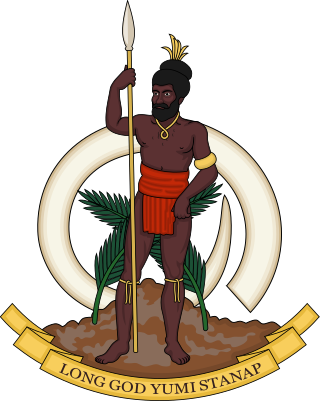
The politics of Vanuatu take place within the framework of a constitutional democracy. The constitution provides for a representative parliamentary system. The head of the Republic is an elected President. The Prime Minister of Vanuatu is the head of government.

Vanuatu maintains diplomatic relations with many countries, and it has a small network of diplomatic missions. Australia, France, Japan, New Zealand, the People's Republic of China, South Korea and the United Kingdom maintain embassies, High Commissions, or missions in Port Vila. The British High Commission maintained a continued presence for almost a century, though closed from 2005 until reopening in 2019.
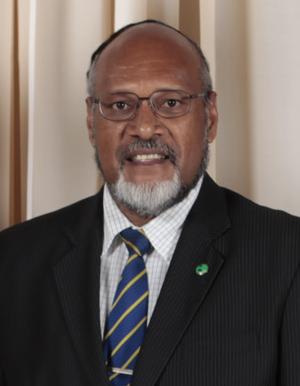
Edward Nipake Natapei Tuta Fanua`araki was a Vanuatuan politician. He was the prime minister of Vanuatu on two occasions, and was previously the minister of Foreign Affairs briefly in 1991, the acting president of Vanuatu from 2 March 1999 to 24 March 1999 and the deputy prime minister. He was the president of the Vanua'aku Pati, a socialist, Anglophone political party.

Walter Hadye Lin̄i was a Raga Anglican priest and politician who was the first Prime Minister of Vanuatu, from independence in 1980 to 1991. He was born at Agatoa village, Pentecost Island. On his mother's side, he was a descendant of the high chief Virasangvulu, while on his father's side, he was descended from the famous weaver, Nuenue, as well as from the high chief Viralalau.
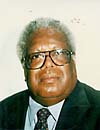
Barak Tame Sopé Mautamata is a ni-Vanuatu politician. He was the leader of the Melanesian Progressive Party and was, until 2008, a member of the Vanuatu parliament from the island of Efate. He was the Prime Minister of Vanuatu from 1999 until 2001, when he was deposed by Parliament in a no confidence vote.

Kalkot Mataskelekele Mauliliu is a Vanuatuan politician who served as the president of Vanuatu from 16 August 2004 to 16 August 2009.

The United Liberation Movement for West Papua (ULMWP) unites the three main political independence movements seeking independence for Western New Guinea from Indonesia under a single umbrella organisation. The ULMWP was formed on 7 December 2014 in Vanuatu uniting the Federal Republic of West Papua (NRFPB), the West Papua National Coalition for Liberation (WPNCL) and the National Parliament of West Papua (NPWP).

The United States and Vanuatu established diplomatic relations on September 30, 1986 – three months to the day after Vanuatu had established diplomatic relations with the Soviet Union. Relations were often tense in the 1980s, under the prime ministership of Father Walter Lini in Vanuatu, but eased after that. At present, bilateral relations consist primarily in US aid to Vanuatu, and are cordial.

Libya–Vanuatu relations refer to foreign relations between Vanuatu and Libya.

The French Republic and the Republic of Vanuatu have long-standing bilateral relations which have varied over the years between tense and amicable. Vanuatu, then known as the New Hebrides, was a Franco-British condominium from 1906 to 1980, and maintained formal relations with both of its former colonial masters after gaining independence. Franco–Vanuatuan relations were rocked by a series of crises in the 1980s, and broke down completely on several occasions, with Vanuatu expelling the French ambassador in 1981, in 1984 and in 1987. Relations improved from the 1990s onwards and, today, France provides development aid to Vanuatu. The two countries also share amicable economic and cultural relations; both are members of the Organisation internationale de la Francophonie.
Robert F. Van Lierop is a United States and ni-Vanuatu lawyer, diplomat, political activist, filmmaker, writer and photojournalist.

An indirect presidential election was held in Vanuatu on 1 September and 2 September 2009. The electors are the 52 MPs and the six heads of provincial governments; ten signatures of support are required for nomination. Outgoing president Kalkot Mataskelekele was renominated for a second term, but Iolu Abil ultimately succeeded in winning a five-year term after three rounds of voting by the electoral college.
The Wantok Blong Yumi Bill was a bill unanimously adopted by the Parliament of Vanuatu in June 2010. It was derived from a "People’s Petition", tabled in Parliament by Independent MP Ralph Regenvanu.

The General Debate of the sixty-eighth session of the United Nations General Assembly commenced on 24 September 2013 and ended on 4 October 2013. Leaders from a number of member states addressed the UNGA. There was controversy in this session. Controversially, Libya broke with protocol.

Indonesia–Solomon Islands relations refers to foreign relations between Indonesia and the Solomon Islands. Solomon Islands has opened their embassy in Jakarta since August 2014, while Indonesian embassy in Port Moresby is also accredited to Solomon Islands. Indonesia is a gateway for Pacific countries to enter the ASEAN and Asian region, while Indonesia wishes to increase its influence in Pacific region. Both countries are the members of Melanesian Spearhead Group (MSG).

The General debate of the seventieth session of the United Nations General Assembly commenced on 28 September and ended on 3 October 2015. Leaders from a number of member states addressed the UNGA.

The General debate of the seventy-first session of the United Nations General Assembly commenced on 20 September and ended on 28 September 2016. Leaders from a number of member states addressed the UNGA.

The General debate of the seventy-third session of the United Nations General Assembly (UNGA) was opened on 25 September and ran until 1 October 2018. Leaders from a number of member states addressed the UNGA.


